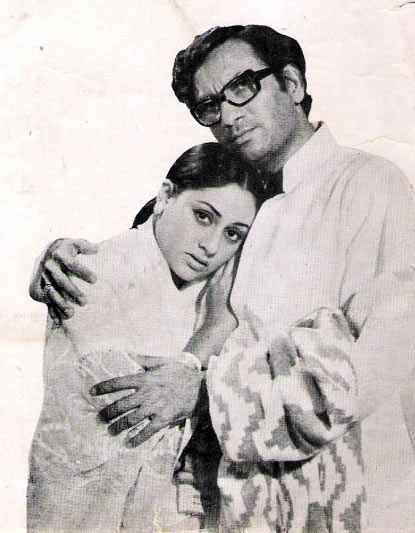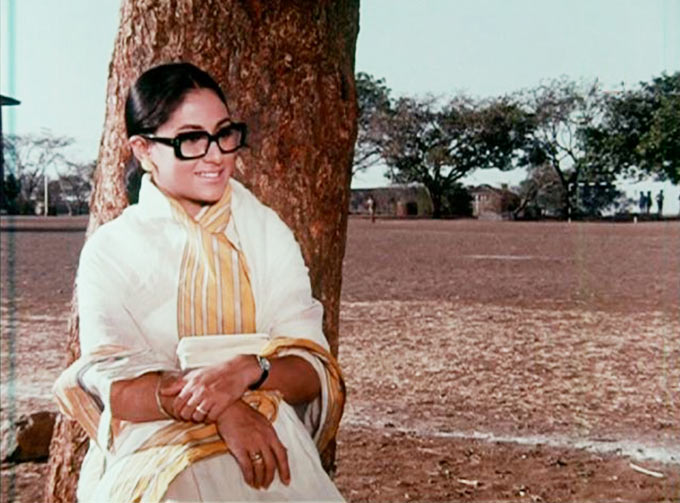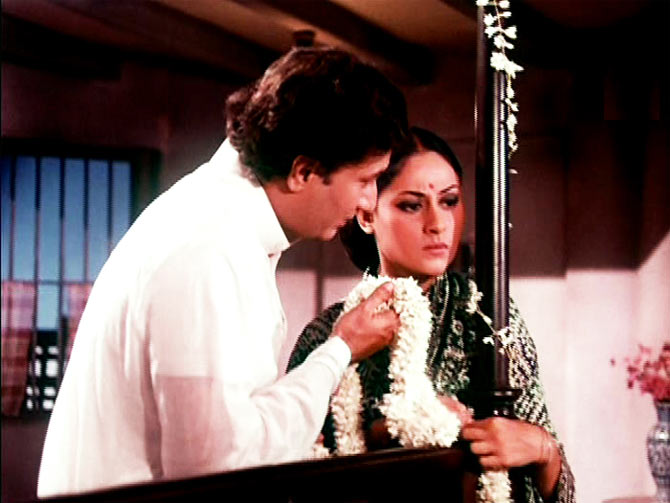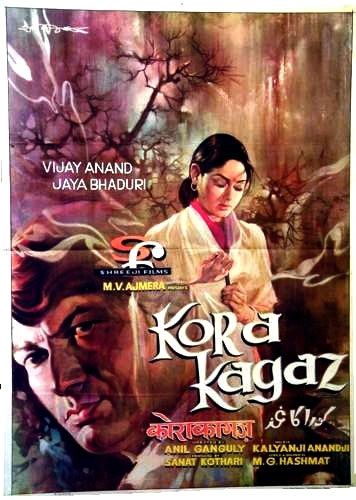 | « Back to article | Print this article |
Classics revisited: Jaya Bachchan's sterling turn in Kora Kagaz
December 05, 2013 18:26 IST
In our special series re-visiting great Hindi film classics, we look back at Jaya Bachchan and Vijay Anand's Kora Kagaz (1974).
Marriage is a complex institution. It brings its own share of requirements, rewards and challenges.
Too bad one isn’t handed a manual at the time of tying the knot, only experiences render a lesson in maturity. Blissful companionship can only develop if two people who are genuinely fond of each other resolve to respect, appreciate and understand their partner's needs and expectations.
The operative word here being two. Any more and a marriage bears the potential to crumble or crash.
Director Anil Ganguly’s 1974 marital drama, Kora Kagaz, starring Jaya Bachchan and Vijay Anand, emphasises why this space is created for two members only and how unsolicited interference from a third will invariably cause a rift.
Additionally, the restraint Kora Kagaz exercises, considering the meddlesome third party here is the girl’s overbearing mother, is most impressive. What typically works as a time-tested ploy to unleash high-pitched melodrama is perceived with surprising humaneness in this feature.
Like Khamoshi, which I revisited recently, Kora Kagaz too is based on Ashutosh Mukhopadhyaya’s story, first adapted in Bengali as Saat Pake Bandha (1963) by Ajoy Kar with Suchitra Sen and Soumitra Chatterjee in the lead.
Click Next to read more.
Getting married
December 05, 2013 18:26 IST
‘Phir wohi din, wohi suraj ki pheeki pheeki roshni mere jeevan ke pathjhad mein hansti hui nazar aati hai,’ reflects Archana (Jaya Bachchan) in a cheerless tone while gazing through the lone window.
Wearing a plain white sari and a thick pair of glasses, her subdued school teacher embraces every new morning with a sense of weariness and monotony that sets in when life ceases to be vibrant, momentous or passionate.
She’s only off-guard in the company of innocent children.
Her desolation, articulated to perfection in the poignant title song, works as a prelude to Kora Kagaz, which unfolds in flashback.
Though hailing from a wealthy family, Archana is a grounded girl who seems to have inherited more of her academician father’s (A K Hangal) moral values than status-conscious mother’s (Achala Sachdev) materialism. She falls in love with Literature Professor Sukesh (Vijay Anand), a scholarly idealist, with a modest salary, unwilling to compromise his ethics and join the money-obsessed rat race.
Even if Archana’s mother is prejudiced against him from day one, her father appreciates Sukesh’s sentiments. Archana and Sukesh get married without any real hitch.
The third angle in the marriage
December 05, 2013 18:26 IST
Problems arise when Archana’s mother begins to unwittingly remote control their marriage. If the same premise was treated with exaggeration in films like Pyar Jhukta Nahi and Chalte Chalte, it is treated rather realistically in Kora Kagaz.
Like the scene where Archana and Sukesh visit her family with lavish gifts for her parents, siblings and domestic help, Archana’s mother remarks on the needless expenditure and how they ought to maintain a budget. Her intention is well-meaning but the timing of her words injures her proud son-in-law a great deal.
Sukesh is conscious of his wife’s previously comfortable lifestyle and aims to please her in a ‘budget’ that’s feasible for him. But her mother's oneupmanship frustrates him beyond repair. She gifts them a refrigerator, installs a telephone in their flat, lies about his profession and humiliates him repeatedly.
All this time, Archana is unable to understand the degree of insult her mother has inflicted on her significant other’s dignity. This hurts the overworked Sukesh (now taking extra tuition) gravely. Unable to sit down and talk it through, they both desperately try to mend things through romantic gestures, which trigger further heartbreak.
The fragile state of their collapsing marriage is evinced in that intimate scene (handled with utmost grace and subtlety by Ganguly) wherein Sukesh tries to appease his cross missus by decorating their bedroom with flowers. She rebuffs him in a move that indicates the hostility has reached its zenith.
The brilliant Jaya Bachchan
December 05, 2013 18:26 IST
Released in 1974 -- a year after Jaya Bachchan did another film about marital discord against the backdrop of frail egos in Hrishikesh Mukherjee’s Abhimaan alongside husband Amitabh Bachchan -- there’s nothing repetitive about her performance in Kora Kagaz.
Unlike Abhimaan’s reserved Uma, Archana speaks her mind and follows her heart. She can be both sarcastic and accommodating as per her will. Essentially though, they’re both graceful and generous human beings.
Jaya Bachchan lends Archana so much dignity, it’s hard not to feel biased and view Kora Kagaz from her point of view alone.
At 26, she demonstrates the composure and calibre of a veteran. Her performances are too pure to be estimated in praise. Understandably, she was awarded with Filmfare trophy for Best Actress.
Vijay Anand doesn’t have the screen presence of his superstar brother, Dev, but he suits the role of a strong-minded intellectual. Ganguly understands his personality and works the character in ways that will make him likeable for what he is. If only, there weren’t so many continuity issues with the filmmaker and occasional actor's ever-changing hair.
As the uppity mother unconsciously causing havoc in her daughter’s life, Achla Sachdev is absolutely terrific. She successfully conveys the absence of malice in her character while highlighting the tendency to weigh ingenuity with income without shrieking, screeching or creating a ruckus.
The music
December 05, 2013 18:26 IST
Sombre toned for most part, Kora Kagaz allows some comic relief through the side track of Archana’s brother (Dinesh Hingoo, long before he became a loud, giggling ham) and his best friend (a delightful Deven Varma) as two good-for-nothing blokes devising business schemes that never take off.
Kora Kagaz has only three songs composed by Kalyanji Anandj but ranks among their best works.
To begin with, there is Kishore Kumar’s stirring rendition of the despondent ditty, Mera jeevan kora kagaz, pertinently penned by M G Hashmat. Ensuing accolades put Kishoreda in a celebratory mood. 'We were very close, and the only party he [Kishore Kumar] ever threw in his house was in our honour after our award for Kora Kagaz," recalls Anandji.
The soundtrack also features Mera padhne mein nahin lage dil and Roothe roothe piye both performed by Lata Mangeshkar. Her perfection in the latter track fetched her a second National Award (following Parichay).
Speaking of National Awards, Kora Kagaz, which fared reasonably at the box office, won for Best Popular Film.
A rare, sensitive film
December 05, 2013 18:26 IST
Kora Kagaz is that rare, sensitive film, which depicts the brittleness of bonds when not allowed to blossom at their own pace and accord. Newly-weds need time and breathing space to adjust to a new environment, a person. The baggage of what a third person says or expects only adds to their woes and leads to pointless bickering and bitterness.
At the same, if this other person doesn’t have the sense to step back, it’s imperative you draw the line. If they truly mean well, they’ll only feel happy if you are.
And so, despite, doing nothing wrong (Na pavan ki, na chaman ki, kiski hai yeh bhool?), Sukesh and Archana hurt their chances by allowing someone else to control their marriage. *Compromise* isn’t a seemly word but *understanding* was specially coined for this relationship.
Kora Kagaz doesn’t dwell on this alone.
It looks at marriage even after two people have gone their separate ways without a real sense of closure. Because, in their case, there could never be one. Which makes the optimistic conclusion in the final railway waiting room scene not a cinematic copout but a genuine, heartfelt culmination.





